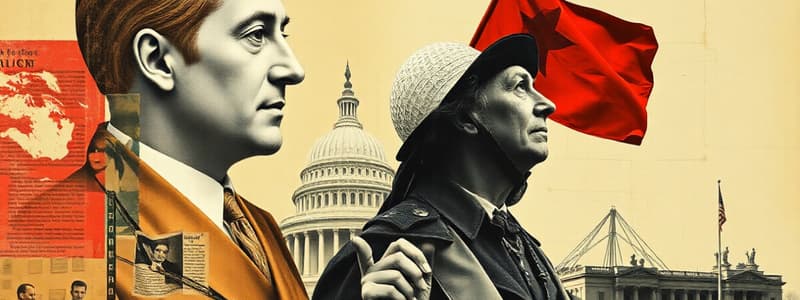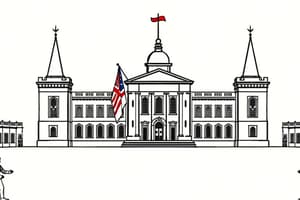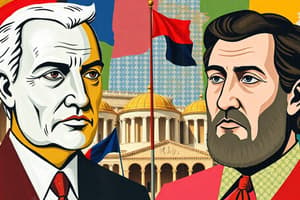Podcast
Questions and Answers
What was the main action taken by the revolutionary government regarding the Catholic Church?
What was the main action taken by the revolutionary government regarding the Catholic Church?
- The state took control of the Catholic Church and seized its lands. (correct)
- The state encouraged religious practices openly.
- The state abolished all forms of religion.
- The Church was granted more political power.
What type of government was established with the formation of the National Convention in 1792?
What type of government was established with the formation of the National Convention in 1792?
- Constitutional monarchy
- Republic (correct)
- Theocracy
- Absolute monarchy
Which of the following factions was known for its opposition to the monarchy and its radical views?
Which of the following factions was known for its opposition to the monarchy and its radical views?
- Moderates
- Royalists
- Jacobins (correct)
- Conservatives
What was the primary goal of the Committee of Public Safety during the Reign of Terror?
What was the primary goal of the Committee of Public Safety during the Reign of Terror?
Which event was a direct result of the radical faction's influence in France during 1792?
Which event was a direct result of the radical faction's influence in France during 1792?
What is a significant outcome of the Reign of Terror led by Maximilien Robespierre?
What is a significant outcome of the Reign of Terror led by Maximilien Robespierre?
What significant change did the constitution of 1791 bring to France's governmental structure?
What significant change did the constitution of 1791 bring to France's governmental structure?
What was the primary cause of the dissatisfaction among peasants towards the revolutionary changes?
What was the primary cause of the dissatisfaction among peasants towards the revolutionary changes?
What circumstances contributed to the formation of the Directory?
What circumstances contributed to the formation of the Directory?
Which of the following factors made the French people support Napoleon as an authoritarian ruler?
Which of the following factors made the French people support Napoleon as an authoritarian ruler?
How did Napoleon legitimized his power after the coup d’état in 1799?
How did Napoleon legitimized his power after the coup d’état in 1799?
What changes did Napoleon implement in the French economy?
What changes did Napoleon implement in the French economy?
What was the purpose of the concordat with Pope Pius VII?
What was the purpose of the concordat with Pope Pius VII?
What did the Napoleonic Code aim to achieve?
What did the Napoleonic Code aim to achieve?
Which of the following was a negative aspect of the Napoleonic Code?
Which of the following was a negative aspect of the Napoleonic Code?
What key outcome resulted from Napoleon's reforms in government structures?
What key outcome resulted from Napoleon's reforms in government structures?
What was one significant factor that contributed to the beginnings of the French Revolution?
What was one significant factor that contributed to the beginnings of the French Revolution?
Which statement best summarizes the Declaration of the Rights of Man and of the Citizen?
Which statement best summarizes the Declaration of the Rights of Man and of the Citizen?
What event involved thousands of women marching from Paris to Versailles in 1789?
What event involved thousands of women marching from Paris to Versailles in 1789?
What was the outcome of the conflict over voting at the Estates-General meeting in 1789?
What was the outcome of the conflict over voting at the Estates-General meeting in 1789?
Why was the Storming of the Bastille significant?
Why was the Storming of the Bastille significant?
What did the Tennis Court Oath signify for the Third Estate?
What did the Tennis Court Oath signify for the Third Estate?
What was a major consequence of the Women's March on Versailles?
What was a major consequence of the Women's March on Versailles?
What significant change did the National Assembly primarily advocate for after the Estates-General?
What significant change did the National Assembly primarily advocate for after the Estates-General?
Flashcards
French Revolution's effect on the Catholic Church
French Revolution's effect on the Catholic Church
The revolutionary government took control of the Church, seized its lands, and limited religious practices.
Peasant Reaction to Church Changes
Peasant Reaction to Church Changes
Many devout peasants opposed the revolution's changes to the Church and lost faith in the reforms.
French Government Change in 1791
French Government Change in 1791
France shifted from an absolute monarchy to a constitutional monarchy, with a new constitution.
Legislative Assembly Factions
Legislative Assembly Factions
Signup and view all the flashcards
Events of 1792
Events of 1792
Signup and view all the flashcards
National Convention Government Type
National Convention Government Type
Signup and view all the flashcards
Jacobins and their Significance
Jacobins and their Significance
Signup and view all the flashcards
The Committee of Public Safety
The Committee of Public Safety
Signup and view all the flashcards
Directory
Directory
Signup and view all the flashcards
Napoleon's rise to power
Napoleon's rise to power
Signup and view all the flashcards
Napoleon's economic changes
Napoleon's economic changes
Signup and view all the flashcards
Napoleon's governmental changes
Napoleon's governmental changes
Signup and view all the flashcards
Concordat with Pope Pius VII
Concordat with Pope Pius VII
Signup and view all the flashcards
Napoleonic Code
Napoleonic Code
Signup and view all the flashcards
Causes for supporting Napoleon
Causes for supporting Napoleon
Signup and view all the flashcards
Plebiscite of 1800
Plebiscite of 1800
Signup and view all the flashcards
Old Regime
Old Regime
Signup and view all the flashcards
Third Estate
Third Estate
Signup and view all the flashcards
Why was the Third Estate eager for change?
Why was the Third Estate eager for change?
Signup and view all the flashcards
Estates-General Meeting
Estates-General Meeting
Signup and view all the flashcards
Conflict over Voting
Conflict over Voting
Signup and view all the flashcards
National Assembly
National Assembly
Signup and view all the flashcards
Tennis Court Oath
Tennis Court Oath
Signup and view all the flashcards
Storming of the Bastille
Storming of the Bastille
Signup and view all the flashcards
Study Notes
Forms of Government
- Direct Democracy: Citizens directly make laws and decisions.
- Republic: Elected officials or representatives make decisions.
- Absolute Monarchy: King or queen holds all power.
- Divine Right: Monarch's power comes from God.
Chapter 5, Section 2
- Edict of Nantes: Religious toleration decree that allowed Huguenots to live in peace in France. King Henry IV, and later revoked by Louis XIV.
- Intendants: French government officials appointed by the monarch. They collected taxes, and administered justice. Their use of power helped Louis XIV gain absolute power.
Chapter 6, Section 2
- Enlightenment: 18th-century intellectual movement emphasizing reason, individual rights, and scientific method.
- Locke's Natural Rights: Belief in inherent rights to life, liberty, and property of citizens and that government's role is to protect these rights.
- Voltaire: Beliefs centered on tolerance, reason, freedom of religion, and freedom of speech.
- Rousseau: Believed civilization corrupted natural goodness and fought for individual freedom and social contract.
- Montesquieu: Advocated for separation of powers (executive, legislative, judicial) and checks and balances.
- Beccaria: Reforms in the justice system: fair treatment, ending torture, and no cruel punishments.
- Wollstonecraft: Advocated for equal rights and education for women.
Chapter 6, Section 4
- Seven Years' War/French and Indian War: British debt increases, leading to taxes on colonists, fueling the American Revolution.
- Stamp Act: Tax on printed materials. It was a key event leading to the American Revolution.
Chapter 7, Section 1
- Articles of Confederation: First U.S. government; weak national government, strong state power. Drawbacks included tax collection challenges.
- Constitutional Convention (1787): Created a new national government. Important in dividing power between branches (legislative, executive, judicial).
- Bill of Rights: First 10 amendments to the U.S. Constitution; protects basic rights and freedoms.
- Enlightenment thinkers: Influenced Bill of Rights, by advocating freedom of speech and religion, and fair justice. Examples include Voltaire and Beccaria.
- Old Regime: Social and political system before the French Revolution. It separated society into three estates with varying privileges.
Chapter 7, Section 2
- Declaration of the Rights of Man and of the Citizen (1789): Revolutionary declaration establishing equality, individual rights.
- French Revolution: Political and social upheaval in France. The French Revolution challenged the existing power structure of the absolute monarchy and led to the establishment of a republic, then a dictatorship.
- National Assembly: Legislative body representing the people, in contradiction to the Estates General.
- Tennis Court Oath: Oath taken by members of the Third Estate of France to not disband until they had written a new constitution for France.
Chapter 7, Section 3
- Napoleon's rise to power: Napoleon gained legitimacy and popular support after a coup de tat.
- Napoleonic Code: Uniform code of laws providing stability, equality and rights to citizens.
- Concordat: Agreement between the French government and the Catholic Church allowing Catholics to practice freely.
- Continental System: Napoleon's attempt to block British trade with Europe.
Chapter 7, Section 4
- Peninsular War: French conflict with Spain and Portugal. It was very costly in terms of human lives.
- Napoleon's Invasion of Russia: Failed invasion fueled by the desire of Napoleon to expand his empire. It led to significant military losses and contributed to his downfall.
- Battle of Trafalgar: Important naval battle where the British Navy defeated the French Navy.
- Battle of Leipzig: Coalition of European countries defeated Napoleon.
- Battle of Waterloo: Napoleon's final defeat by the British and Prussian forces which ends his rule.
- Congress of Vienna: International meeting to restore balance and long-term peace in Europe after Napoleon's rule.
Chapter 7, Section 5
- Congress of Vienna: Meeting of European powers to restore order and stability after Napoleonic Wars. It aimed to prevent future revolutions and restore monarchy.
- Legitimacy: Restoring former monarchs to their thrones.
- Balance of Power: Maintaining equilibrium between nations to prevent one from becoming too powerful.
- Concert of Europe: Alliances among European powers to cooperate and prevent revolution.
Studying That Suits You
Use AI to generate personalized quizzes and flashcards to suit your learning preferences.




